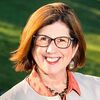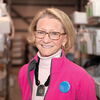Continuing to move beyond the 'salon,' Akari expands
 photo/MATT DODGE
Allan Labos, 59, says a recession is what first prompted him to switch gears from studying mechanical engineering to pursuing a career as a stylist. After 25 years in Portland, Labos says hard economic times have continued to provide new opportunities, including an upcoming expansion of his business, Akari.
photo/MATT DODGE
Allan Labos, 59, says a recession is what first prompted him to switch gears from studying mechanical engineering to pursuing a career as a stylist. After 25 years in Portland, Labos says hard economic times have continued to provide new opportunities, including an upcoming expansion of his business, Akari.
Allan Labos says he's not scared by a recession. In fact, the owner of Akari -- a "wellness, beauty and style" center -- says he sees a bad economy as a time of opportunity.
"When everything is good and you're running at top speed, it's hard to stop. But when things slow down, it gives you a chance to regroup [and] change your vision," says Labos.
That's happened a lot since Labos launched his career under the wings of Vidal Sassoon and landed in Maine 25 years ago.
Akari outgrew its original Fore Street location five years ago, prompting a move to its three-story location on Middle Street. In the coming weeks, the business will expand again, adding studios for aero yoga (think the satin scalers from Cirque du Soleil) and pilates in an adjacent building Labos purchased recently.
"We started with six people in an 800-square-foot space and every six months to a year we busted down a wall and took over more space until we took over the whole building," Labos says.
Along with spatial expansion of the wellness, beauty and style center — Labos cringes at the narrower classification of a "salon" — Akari has steadily expanded its offerings, adding to the staff that now numbers 50. That growth reflects a business model Labos says is important for Akari's bottom line.
"Because our palette is so varied, we don't have to make a lot of money on any particular service. We would rather have a client shop across the brands, we see that as a better revenue [generator]," he says.
With over 35,000 customers and 50,000 services on the books each year, Labos says Akari's revenues have grown from "barely six figures" to "multi millions" since opening, allowing the business to steadily expand while capturing industry honors like the 2010 "salon of the year" runner-up nod from Salon Today magazine.
Another part of creating that capacity for that growth, Labos says, is a European approach to staff development. Nearly all of his staff start at the same level, then advance through an in-house apprenticeship program.
"We are not selling a service, we are selling an experience and there is a flow to what we do," Labos says. "That requires people to start at the ground level, greeting customers before you start performing services on them."
That in-house training, which can last as long as nine months, spans offerings of nail, makeup, skin, podiatry, massage and "medical spa" services like laser treatments, chemical peels and injections.
"We are building careers, not job fillers," says Labos.
That approach has benefits outside of the business as well, according to Jan Beitzer, Portland Downtown District's executive director.
"It's been good for their business but great for the city because then they train people at a high level, so they don't have to go to Boston or New York," Beitzer says.
Labos estimates that Akari also attracts some 25,000 out-of-town visitors annually.
"He's a destination business at this point, and the fact that he is able to expand yet again is just terrific for the Old Port and for our brand," Beitzer says, "that it's a locally owned, independently run business."
Virtues of a smaller market
While studying mechanical engineering in London in the early 1970s, the Gibraltar-born Labos saw his job prospects slipping away amid the recession of 1973 to 1975 and he decided to make a dramatic life change.
"I was living in a building full of hairdressers and they seemed to be having a lot of fun," says Labos.
He swapped out drafting tables and slide rules for curling irons and scissors and eventually landed a job working with Vidal Sassoon, moving up and eventually managing the renowned stylist's salons in Los Angeles, Chicago and New York.
Seeking a better quality of life, Labos says, he left New York for Portland in 1985. But he didn't leave behind his big city work ethic.
"Working in those metropolitan areas, you have to work hard to succeed," he says. "You have to work stronger, longer and be more creative to succeed because it's a big pond, so I was used to working hard."
Initially, Labos says he found working in Portland to be "a little humbling." After a career spent charging $250 for a haircut, the city's going rate of $18 required the stylist to reconsider his role in the local market and used the mid-'80s recession as an opportunity to re-imagine his business.
Operating out of NYC or L.A., there is a lot of pressure to keep up with the "next big thing," Labos says, but that's not so in Portland. Labos says the smaller market allows him the freedom to assess trends and fads from an objective distance.
"In bigger markets, there are much more educated consumers. The changes in the industry are happening there much quicker and sort of ripple out, [but] you have to be careful which wave you ride," he says.
"Here, we are a little bit behind the edge, which is good, because we don't take on every trend. Some things could be a passing trend and some are actually solid changes for the better, but being here, you know what to bring to this market because you've already seen it being tested and can adapt."
The available work force is another example of the stark contrast between Portland and a large metro area like NYC, he says.
"In NYC, you can advertise for a position and maybe 12 people show up. Here, we have to work a little harder, but when you come across good people, you find a way of getting them in."
To that end, Labos points to the example of Akari's current general manager, who once fitted him for a jacket at a Freeport clothing store.
"I said, 'I'm very impressed with the way you took care of me' and now she is the general manager," he says. "It's all based on character."
Aiming to serve three generations of clientele, Labos says the range of customers coming through the doors helps to keep his staff on their toes.
"We enjoy that kind of range, as artists and craftsmen, that wide variety of ages, backgrounds and social positions keeps us very fresh," says Labos.
Labos says Akari's mission to constantly reinvent its slate of services and raise the bar of taste and style in Portland harkens back to his time working under Sassoon.
"He told me to leave the industry better than I found it so the next generation can take it to a different level," says Labos. "That's what we profess to do here."









Comments